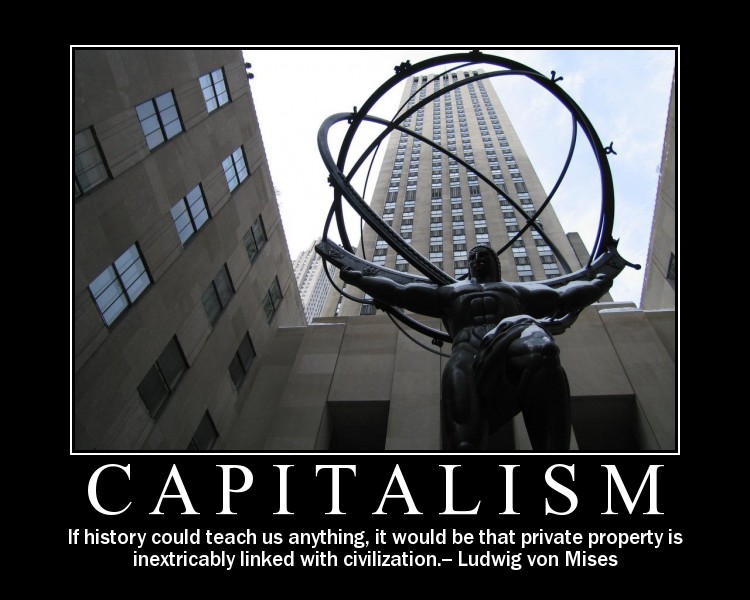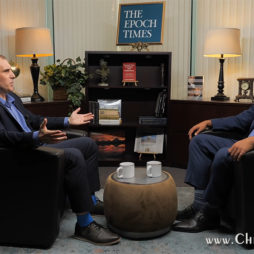 by Chris Banescu –
by Chris Banescu –
In today’s turbulent financial times and difficult economic conditions, a lot of unjustified criticism and unwarranted accusations have been laid at the doorstep of capitalism. Many in the mainstream press and academia, a majority of politicians, and a large number of Americans have jumped on the bandwagon and unfairly blame capitalistic principles for the huge mess that we are in. Such widespread confusion evidences a misunderstanding by many Americans of how value is actually created in society and what capitalism really represents.
All societies, in order to prosper, grow, and take care of its citizens must create new value to sustain its economy and support an expanding population. Common sense and experience dictate that there are only three (3) possible ways for anyone in life to have, create, or obtain value (monetary or economic) or acquire any assets (property) to be able to live or sustain oneself or one’s family:
(1) You ethically earn it by working and providing value to your employer, investing in other people’s ventures, risking it in a new business to provide new value to others via a service or product, or by inventing, creating, or discovering something new and original, that is useful (device, process, cure) or pleasing (literature, music, art) to others. This is known as ethical capitalism, which I’ll simply call “capitalism” going forward.
(2) You appropriate it from others, or someone else (person, institution, or government) appropriates it on your behalf. Communism, socialism, the US government (federal, state, and local), and criminals practice this approach. This choice is always coercive, but legal in some cases (taxation) and illegal in others (criminality).
(3) Someone voluntarily gives it to you, through a gift, a will, a trust, or a charity donation. Note however, that in order for someone (individual, government, church, institution, etc.) to have any value (money or assets) to give, they must first attain it by choice #1 or #2 above. No other source for the donation exists.
Inherent in option #1 is also the absolute right of individuals and organizations to have and own property (money, assets, etc.) that is exclusively theirs and the right to dispose of such property as they see fit without interference from anyone else.
The only fair, ethical, and truly voluntary model of creating and obtaining value, based fully on freedom and the greatest respect for the individual, is option #1. Choice #3 is a close second, but it still depends on first having acquired value ethically via option #1.
I did not include under choice #1 the unethical, lying, criminal, or abusive individuals, organizations, and enterprises that do not practice ethical capitalism, earn millions or billions by defrauding customers, abusing employees, or cheating investors, and eventually wind up destroying the long-term value of their businesses. Such conduct is not representative of true capitalism and those who practice it have more in common with feudal lords and totalitarian dictators.
What is Capitalism and Money
The concept known as “capitalism” simply explains the relationship of voluntary exchanges of value for value between free individuals. It’s a word that describes how free human beings voluntarily interact with one another to exchange value (usually in the form of money in return for goods or services) in order to be able to live (food, clothing, and housing) and how they invest the excess value they have earned to produce, create, and gain more value. Capitalism is value and morally neutral.
Capitalism also encompasses the concept that any value (“capital”) that is placed at “risk” in a new business or invested in a new venture should generate some additional value (“return”) in exchange for the additional risk that an individual takes on. Capital can be in the form of money or other assets.
Money is simply a way to standardize the measurement of value and provide a common method of the exchange of value in transactions between individuals. Like capitalism, money is also value and morally neutral. As the saying goes “the love of money” for money’s sake (greed) is the “root of all evil”, not money itself.
Risk vs. Return, the Foundation of Capitalism
Under capitalistic principles, new value can only be created when individuals risk investing their existing capital (money or assets), skills, time, and efforts in the hope of achieving a certain expected return (increase in value). Creative and innovative individuals can also create, invent, or discover new value by offering something useful (computer, vaccine, electric car) or pleasing (book, music, art) to others in society.
In attempting to create new value, you endanger (risk) the value you currently have plus any additional effort and hard work you’re willing to invest, in the hope of receiving a corresponding reward (return) for the new risk that you have taken on. The greater the risk you undertake, the greater the return you should aim for and expect, otherwise it would be foolish and dangerous to risk your existing value for too little reward.
Frederick P. Schandler explains: “Risk is defined as the chance of financial loss, as measured by the variability of expected returns associated with a given asset. A decision maker should evaluate an investment by measuring the change of loss, or risk, and comparing the expected risk to the expected return. … Some assets are considered risk-free; the most common example are US Treasury bills.”
Scientists, researchers, inventors, and artists also invest their knowledge, time, education, and efforts in creating or discovering new value. They risk many years of training and hard work in order to achieve a corresponding result (return). Sometimes the return earned is measured in monetary reward, worldwide acclaim, personal satisfaction, or professional recognition (awards, titles, etc.).
Most investors are “risk-averse”, which means that they do not like taking on risk without a corresponding increased rate of return. The higher the risk of an investment, the higher the interest rate that an individual will demand from that specific investment for taking on the greater risk.
Money Markets, CDs, and US Treasury Bills
For example, if you have saved $10,000 and do not like risk, you could purchase a US Treasury bill that guarantees a small rate of return. You could also entrust your money to a bank in the form of a money market or a certificate of deposit account that also earns you a small rate of return. As of January 2009, a 1-year CD in a US bank would earn interest at a rate of approximately 2.5% a year. Assuming your bank is insured by the FDIC (most banks are), your money would be guaranteed by the federal government up to $250,000 (going back to $100,000 on 12/31/2009). Such an investment option is virtually risk-free (barring the collapse of the U.S. government) and consequently offers you a limited return. When subtracting the annual rate of inflation, even before taxes are taken out, the real rate of return for such a “risk-free” investment is approximately 1%; not enough to guarantee you a comfortable retirement, unless you’re already a multi-millionaire.
Corporate Bonds and Junk Bonds
Alternatively, if you’re able to tolerate more risk you can loan the $10,000 to a reputable and stable corporation and earn a much higher rate of return; this is known as a bond (corporate bond or investment grade bond). Since there are additional risks inherent with bonds, especially “default risk” — that the borrower-company may go out of business and not be able to pay you back — the corresponding rate of return offered must be greater than the “risk-free” rate of 2.5%. If a company does not offer investors an interest rate (presently at least 4% to 6%) a few percentage points higher than the risk-free rate, no sensible person would be willing to loan them the money.
Corporations facing financial or operating difficulties or carrying high debt, must offer even higher interest rates (8%, 9%, or even 10%) to attract investors. These are often called high-yield or junk bonds due their high risk and high likelihood of default; they are rated below investment grade bonds. Moderating the risk of bond holders, including junk bond owners, is their ability to get paid ahead of any stock holders in case the corporation goes belly up.
Stocks
If you’re willing to take on even greater risk for a higher potential return, you can purchase stocks (shares) in publicly-traded companies. Stocks are ownership interests in a corporation that represent a proportional share of its assets and profits. When you purchase stocks you are hoping that a company’s assets and profitability will increase in the future, leading to much higher value for the shares that you own. As with bonds, there is significant risk that a corporation’s profitability will not improve over the long run, that it may go out of business, or that it will not grow in value over the long term. Luckily, some corporations also pay shareholders dividends (portion of profits) on a quarterly, semi-annual, or annual basis, which provides some tangible return and reduces some of the risk inherent in stock ownership.
Historically, US stocks have returned, on average, approximately 11.8% per year between 1928 and 2007. This higher return rate requires that investors diversify their stocks (spread across various companies in different industries) and have a long-term commitment measured in 10 to 20 year terms. Year to year however, the stock market can experience significant fluctuations; 2008 being a sobering example of dramatic negative changes in the market.
Venture Capitalists and Entrepreneurship
Finally, if your risk tolerance is very high and have an entrepreneurial spirit, you may choose to become a venture capitalist (VC) investor in other companies or start your own business to bring a new product and/or service to the marketplace. Both of these avenues carry extremely high risk, but also present the possibility of substantial returns. While various studies show slightly different results, on average, 50 to 66% of all US startups fail within 4-5 years of launch.
As a venture capitalist you will insist on significant returns for the hefty risk you undertake when investing in a new or existing business. According to Stanley R. Rich and David E. Gumpert, “investors believe companies with fully developed products and proven management teams should yield between 35% and 40% on their investment, while those with incomplete products and management teams are expected to bring in 60% annual compounded returns.”
As an entrepreneur, you also face high risks but can hope for sizeable returns. On average, your business will have a 50 to 66% chance of failure within the first few years; you can lose all the money and effort you have invested. However, the possibility for success and profitability are only limited by the quality and demand of your product or service, level of dedication, skill, and hard work you are willing to invest in your business, and your patience and perseverance in working towards increasing the long-term value and profitability of your company. As evidenced by men like Bill Gates (co-founder of Microsoft) and Michael Dell (founder of Dell ), a great idea, some startup funds, and years of hard work and commitment can translate into rewards of billions or tens of billions of dollars of created value for their founders.
Capitalism’s Universal Application
Like the law of gravity and the laws of mathematics, capitalistic principles are universally applicable regardless of whether individuals and societies choose to acknowledge or follow them. Capitalism operates wherever human beings live. How do we know capitalism exists and is fundamentally true? As experience has shown, when individuals and societies follow capitalistic principles (ethically), the results are overwhelmingly positive and beneficial. Whenever they don’t, the results are often catastrophic and sometimes deadly to millions of innocent people.





I was not a finance major, but most of this sounds accurate: I am certainly grateful to Microsoft as it has provided me and millions of others a very solid and lucrative way of life for the past 20 years because of the entrepreneurial skills of a few talented individuals.
One thing caught my eye, however: “As an entrepreneur, you also face high risks but can hope for sizeable return”
I think the key word is “hope”. What level of risk is appropriate for companies and who decides what that level is? The reason we’re in the financial mess we’re in now is because of the willingness (and even eagerness) of numerous mammoth lending institutions to bank the futures of their businesses in poorly understood, high risk investments. The fundamental gamble, of course, was that the housing market would continue to rise indefinitely (a foolish speculation, even given my lack of financial savvy). From this came Ninja loans, subprime lending, securitizations and credit default swaps.
I think one of the principles of capitalism is that the losers of the gamble must fall. Businesses that can’t compete will go under. It’s a reasonable system, but unfortunately, most Americans and companies apparently lose those principles and ideals (some of them drastically so as evidenced by the rise in crime) when it comes to their jobs and livelihoods and whether they can put food on the table. Hence, the request by automakers, insurance companies and banks for bailout money.
I don’t really have an answer for this all. I’m hardly suggesting government control of all commercial enterprises. Yet, I can’t help but wonder if risk should not be legally limited to a certain relative level depending on the size of the company. Perhaps it’s a “necessary evil”, since capitalism will only work when those who live under it are willing to face all of its consequences when the system plays itself out.
As it stands, it seems we are not.
James, You are correct, many of these institutions took on an enormous amount of risk (many times not even paying sufficient attention to how much risk they undertook) and the consequence of their very poor decisions should be bankruptcy. Unfortunately, our government is stepping in (violating capitalistic and free market principles) and rewarding these failures with more taxpayer dollars. Worse still, very few of the executives who allowed such insanity to exist and prosper have been held accountable for their mistakes and violations of fiduciary responsibilities. That’s absolutely not ethical, just, or fair.
Chris, you wrote a great article and I enjoyed reading it. It is mostly what you have been discussing with me over the past many months.
As I agree with you that capitalism is the ultimate choice over any other economic system; however, it is a form has many flaws that are hard to avoid due to our general nature being greedy and selfish creatures. Furthermore, any man-made created system is flawed to a certain degree and we only learn of such flaws out of on-going experience and we need to correct them as we go along. Therefore, I do not think that the pure form of capitalism can work. Such fact is clearly reflected in the demise of the economic system in the capital of capitalism, the United States of America.
I believe what our economic system is going through its natural course of warning signs of its flaws; they have happened at our peak as the greatest economy of the world. During any system’s peak, many of the imperfections surface and a correction(s) are mandated to correct it and eliminate any possible catastrophes. It is obvious that the power running the economy is confined to very few institutions and individuals that drive every aspect of our daily life; such power must be controlled and regulated. Today, an eminent collapse to the system is threatening the very fabric of the society and such collapse is driven by the greed of those few entities that are running our nation with very minimal to no serious and thoughtful regulations. This threat can create a ‘domino effect’ that can lead us to wars and many other negative impacts that can and should be eliminated. In addition, such confinement of power without regulation is nothing more than pure dictatorship allocated to few individuals.
Regulating the system may seam an injection of some of the socialist idealism or any other system that may conflict with the capitalism protocol and ideology. Yet, I strongly believe that the power of our great nation is mainly based on the potpourri of ideas and theologies that came from every corner of the world with the different generations of immigrants. Injecting good ideologies derived from other systems and experiences can enhance capitalism and make it work to protect its integrity. In conclusion, a CAPITALISM-socio’ system may be a more practical and realistic system for us.
Thank you Chris Banescu!
I was beginning to think there were no Eastern Orthodox Christians willing to defend the free market. I just finished listening to you being interviewed on “The Illumined Heart”. What a breath of fresh air!
Now that I’ve read your article, I have an even clearer idea of where you are coming from. I am intensely interested in the Austrian school of economics and the political philosophy of libertarianism. I will have to keep reading your blog to see if and where we differ.
Once again, it is so good to hear someone who shares my faith stand up for the free market!
Some historians think that the Byzantine empire was less of a control system than previous thought. Both the Byzantine empire and the governments in Western Europe had to evolve away from the late Roman Empire’s control on movement where coloni or serfs were tied to the land and people were force to follow the trade’s of their fathers. Byzantines didn’t fully eliminate interest like some in Western Europe did in the early medival period. However, by the late empire the upper class thought it was better to be a landowner than a merchant. As for the orthodox many of them think like the fame emperor Justinian I and don’t understand economics. After the Plague in 541, the emperor impose wage and price controls since he thought that people were being too greedy. In fact after a Plague, prices and wages will rise since their is a labor shortage same thing happen in the 1300’s with the black Plague. Catholics and the Orthodox need to consider like Protestants did that we always have some sort of market system.
But isn’t the systemic risk of letting AIG collapse too great? Sure, the market may one day hash things out, but it may not. Moreover, the hurt would be so great in the short-term in a number of fields. Capitalism and humanitarianism are not always mutually inclusive. Furthermore, laissez-faire capitalism tends to assume that people are rational actors, but the over-leveraging that occurred while mortgage-backed securities were rated so highly serves as a salient counterpoint.
Free markets have a firm foundation in Orthodox Christianity, in Matthew 25:14 ff. and Luke 19:12 ff. To understand the parable of the talents is to know weare required to use our gifts properly but without fear.
Capitalism is the “least worst” way of channeling our wordly efforts properly. As noted it is, like any human device, limited and flawed, but we must persevere.
To the specific issue of regulating free markets, we cannot trust the limited and flawed humans in government to micro-manage the affairs of the limited and flawed humans in business.
Rather, the right role of government is more modest – to enforce the premises of free markets: many independent agents, free flow of information, no subsidies, no monopolies, and, after repeated blunders, no “too big to fail.”
With AIG, from professional experience I state unambiguously that the government panicked last fall. AIG should have been handled in bankruptcy, where we have well-documented and long-established procedures and priorities to manage such events fairly, equitably, and without political games. Note that a bankruptcy would only impact the sophisticated players who dealt with the parent company. The millions of individual policyholders, insured by the myriad operating subsidiaries, were never in any danger of loss.